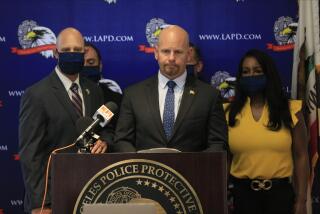Guards’ actions defended
- Share via
WASHINGTON — Top State Department officials and the head of their beleaguered private security firm, Blackwater USA, put forth a unified defense Tuesday against an onslaught of congressional criticism over the company’s violent encounters with Iraqis.
The State Department and security officials attempted to portray Blackwater’s armed guards as highly trained professionals who open fire in the streets of Baghdad only when the lives of the diplomats they are hired to protect are threatened.
At a daylong Capitol Hill hearing, Erik Prince -- the company’s chairman and a former Navy SEAL -- responded to accusations of misconduct by defending his employees’ performance and maintaining that the State Department was a meticulous overseer that held the contractors to exacting standards.
At the same time, the State Department’s top Iraq coordinator, David M. Satterfield, praised Blackwater and said its guards had performed “exceedingly well.” He denied that the department had improperly allowed contractors to evade prosecution for wrongdoing.
“We do believe that the overall mission of security contractors in Iraq is performed . . . with professionalism, with courage,” Satterfield said.
The mutual defense, in back-to-back appearances before the House Oversight Committee, seemed to frustrate congressional Democrats. At one point, Rep. Jan Schakowsky of Illinois accused the State Department’s top security official of parroting Blackwater’s “talking points.”
The lawmakers cited incidents involving Blackwater guards -- whom they accused of being “cowboys” -- and attempted to present a pattern of wrongdoing. For example, Democrats on the panel demanded explanations for how an intoxicated Blackwater contractor shot and killed a guard for Iraq’s vice president on Christmas Eve, and why a company convoy had rammed 18 civilian vehicles in another incident.
But Prince, 38, who answered questions politely, sought to depict any wrongdoing as rare occurrences that his company dealt with promptly by firing the offenders.
“If there is any sort of discipline problem, whether it’s bad attitude, a dirty weapon, riding someone’s bike that’s not his, we fire him,” Prince said. “If they don’t hold to the standard, they have one decision to make: window or aisle.”
The high-profile inquiry, held in a packed hearing room in which spectators had waited hours to get seats, came in the aftermath of a Sept. 16 shooting involving Blackwater contractors who were protecting a U.S. diplomatic convoy. At least 11 Iraqis died. The incident enraged Iraqi officials, who accused the guards of firing without provocation. They attempted to strip the company of its right to operate inside the country. In recent weeks, Blackwater and the State Department have defended the guards, saying they had acted in response to an ambush.
But at Tuesday’s hearing, committee Chairman Henry A. Waxman (D-Beverly Hills) said he would not raise the Sept. 16 incident with Prince after the Justice Department warned that doing so could compromise a just-opened FBI investigation.
Instead, the hearing focused on the Christmas Eve shooting, in which the Blackwater guard was whisked out of Iraq less than 36 hours after the slaying of an Iraqi bodyguard. Pressed to explain Blackwater’s decision not to punish the unidentified contractor more severely, Prince said the company had done all it legally could.
“Sir, we fired him. We fined him,” Prince said. “But we, as a private organization, can’t do anything more. We can’t flog him. We can’t incarcerate him. That’s up to the Justice Department. We are not empowered to enforce U.S. law.”
The Justice Department has said an investigation into the incident is ongoing. An e-mail obtained by the committee and made public Tuesday showed that Blackwater withheld $13,067 in bonuses from the contractor involved in the shooting and forced him to pay his airfare back to the U.S., valued at $1,630.
Committee members appeared most frustrated with answers from State Department officials, including Satterfield, who at times stepped around questions about specific incidents and U.S. laws.
Asked why the Blackwater guard involved in the Christmas Eve shooting was allowed to leave Iraq, Richard J. Griffin, assistant secretary for the State Department’s Diplomatic Security Bureau, was curt: “At the time of the incident, after a number of interviews were conducted, there was no reason for him to stay in Baghdad.”
The State Department officials also could not say with certainty whether any Blackwater guard could be prosecuted under U.S. law.
Under current Iraqi law -- a holdover from when the U.S.-led Coalition Provisional Authority was in power -- American contractors are immune from prosecution by Baghdad authorities. The Pentagon maintains that private guards are subject to both U.S. military law and to more recent statutes governing the conduct of contractors who deploy with U.S. troops.
Legal questions pertaining to contractors are “very murky,” Griffin testified, adding that confusion over which laws apply may have delayed Justice Department action in the Christmas Eve case.
Among lawmakers, the defense of Blackwater broke along partisan lines, with almost all Republicans on the panel praising the company’s behavior and some suggesting Waxman was using the security firm as a proxy to criticize the Bush administration’s conduct of the war in Iraq.
Republicans repeatedly pointed out that no U.S. official under Blackwater’s protection has been killed or seriously wounded in Iraq -- a testament, they argued, to the company’s proficiency.
“That’s a perfect record, and you don’t get any credit for it, for some reason,” said Rep. Christopher Shays (R-Conn.).
Prince sought to portray the 195 shooting incidents the company has been involved in since 2005 as rare occurrences. He said that so far this year, Blackwater has guarded 1,873 convoys, out of which there were 56 shootings, or less than 3% of all assignments. Last year, the company had 6,254 missions and 38 incidents.
Prince also said committee calculations that Blackwater guards had fired first in more than 80% of the shootings were misleading. Many of those involved suspected car bombs that were moving toward diplomatic convoys, he said.
Committee Democrats accused Blackwater of attempting to cover up misconduct by its guards, pointing to a June 2005 incident in Hillah in which a contractor failed to report an improper shooting and asked fellow guards not to discuss it.
Prince responded that the guards who hid evidence in the incident were fired and said the company then promptly reported the incident to the U.S. Embassy. “He was terminated, not for inappropriate shooting, but for not following reporting procedures,” Prince said.
He said Blackwater had been unfairly accused of widespread misdeeds, arguing that because of the company’s prominence, it gets blamed for incidents that involve rival security firms.
“There’s 170-some security companies operating through Iraq. We get painted with a very broad brush on a lot of the stuff they do,” he said, noting that the company routinely gets false reports of its guards being involved in attacks. “If a private security contractor did it, it often gets attributed to us.”
--
--
(BEGIN TEXT OF INFOBOX)
Diplomatic guards
Until recently, U.S. embassies abroad were guarded by the U.S. military and the State Department’s Diplomatic Security Service.
The Marines in particular have played an important role, protecting U.S. diplomats as early as 1835. After World War II, foreign intelligence activities spelled out the need for constant protection at U.S. facilities overseas. Congress adopted the Foreign Service Act of 1946, giving the Navy and Marines primary responsibility for protecting U.S. missions.
It remained that way until the Vietnam War. As the military downsized after Vietnam and the end of the Cold War, U.S. officials reevaluated the use of uniformed soldiers in many support functions. In the early 1990s, the military began its Logistics Civil Augmentation Program, entailing the use of private contractors for noncombat functions. One of the earliest contractors was Halliburton Co.
The State Department followed suit, using private contractors to protect U.S. diplomatic efforts for the first time in Haiti in 1994.
Since then, the practice has ballooned, with Iraq the largest such effort. There, the State Department has more than 1,000 private guards provided by three firms, the largest of which is Blackwater USA.
--
Source: Times research
--
(BEGIN TEXT OF INFOBOX)
Erik Prince
Title: Chairman, Blackwater USA
Age: 38
Childhood: Raised in Holland, Mich.
Education: Hillsdale College, Michigan
Military: Attended U.S. Naval Academy, left for college, then returned to the Navy in 1992 joining SEAL team. Served in Haiti, Middle East, Bosnia.
Business: With family money, he founded Blackwater USA in 1997 with Navy friends as a training center for law enforcement and commercial and government security. In 2001, Moyock, N.C.-based Blackwater recorded $736,906 in annual government contracts. By 2006, it had nearly $600 million in annual contracts. Also founded Blackwater parent company Prince Group.
Charitable/philanthropic: Board member of Christian Freedom International, which seeks to aid persecuted Christians worldwide. Through foundations, he funds various religious and conservative groups.
Family: First wife Joan died in 2003, leaving four children. Prince also has two children with his second wife.
Source: Times research
More to Read
Get the L.A. Times Politics newsletter
Deeply reported insights into legislation, politics and policy from Sacramento, Washington and beyond. In your inbox twice per week.
You may occasionally receive promotional content from the Los Angeles Times.










